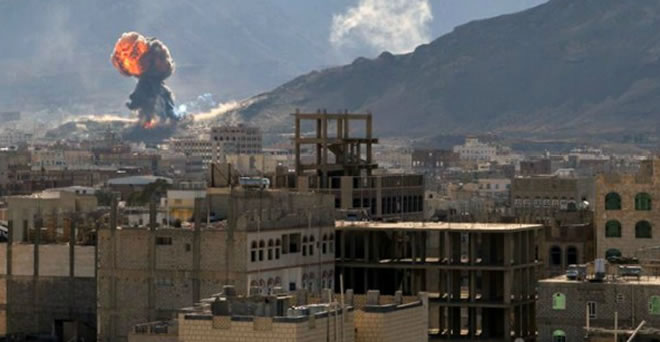
Yemen's powerful Houthi movement fights artillery battles with the army near the presidential palace in the capital, drawing accusations that the militia fighters are mounting a coup

By Ali al-Mujahed and Hugh Naylor
Tuesday, January 20, 2015
SANAA, Yemen (WPost) — Shiite insurgents overran Yemen’s presidential palace and shelled the president’s residence Tuesday in an escalating offensive striking at the heart of the Western-allied government.
The coup-style strikes by the Houthi rebel faction — believed backed by Iran — posed the most serious challenge yet to President Abed Rabbo Mansour Hadi, a staunch ally of the United States in the fight against al-Qaeda’s powerful branch in Yemen.
But the overall objectives of the rebels remained unclear in a country beset by near nonstop unrest, a growing water shortage and splintered into a patchwork of rivalries.
The top Houthi leader, Abdulmalik Houthi, planned to give a speech later Tuesday that could help clarify the fast-moving events — capping months of steady gains by the Houthis.
A statement posted in advance on a Houthi-run Web site claimed the group’s fighters took control of the presidential palace — about three miles from the residence — to avoid weapons looting amid the chaos. Government officials, meanwhile, insist the rebels seek to drive Hadi from power and claim control of the capital.
A Yemeni government official, who spoke on condition of anonymity because of concern for his safety, confirmed that Yemen’s president was pinned down in his residence after it came under attack.
A government collapse could send the country into full-scale civil war and raise fears of militant factions cementing control of key territory in the southwestern corner of the Arabian Peninsula.
Further instability also would reverberate far from Yemen. The group al-Qaeda in the Arabian Peninsula (AQAP) is seen one of the most active threats to the United States and its allies in the region. The group claimed a role in masterminding the deadliest attack in three days of terror in Paris earlier this month.
“This is a coup. There is no other word to describe what is happening but a coup,” Col. Saleh al-Jamalani, the commander of the Presidential Protection Force, told the Associated Press.
Another government official said the country’s prime minister, Khaled Bahah, had been trapped inside another palace by the Shiite fighters since Monday.
The Houthis have mounted sporadic rebellions since 2004 over perceived government discrimination in a country nearly two-thirds Sunni. Since September, the rebels have steadily moved beyond their traditional strongholds in the northern part of the country.
Their advance on the capital and beyond in recent months has badly weakened the 69-year-old Hadi, a former general who is relied upon by Washington for support in U.S. drone strikes targeting AQAP militants.
“The world is very much occupied with what’s going on with Iraq and Syria, but we could find ourselves facing another civil war situation in Yemen, but one where there is a power vacuum for extremists,” said Riad Kahwaji, chief executive of the Dubai-based Institute for Near East and Gulf Military Analysis.
Yemen’s information minister, Nadia Sakkaf, wrote in an Arabic tweet that the “Yemeni president is being attacked by armed militias that want to overthrow” the government.
She also wrote that the presidential palace “has been under attack” since 3 p.m. “even though political talks are still ongoing.”
The Houthis’ rapid victories have included taking control of state-run media outlets and government buildings, notably the headquarters of the Yemeni intelligence service.
Hakim Almasmari, a Yemeni journalist, said Hadi’s forces are undercut because of internal tensions in the military after the president tried to oust officers seen as loyal to his predecessor, Ali Abdullah Saleh.
Saleh, a Shiite, was ousted in 2012 after an Arab Spring-inspired uprising and could exert greater influence if the current government falls.
“Hadi has no loyalty with the army, and that’s why you see the Houthis in power today,” Almasmari said.
The showdown atmosphere has deepened since clashes Monday, when at least nine people were killed after the collapse of a cease-fire between Houthi fighters and government forces.
Iran’s state-run Press TV reported that Houthi rebels set up checkpoints near the president’s residence and fanned out on patrols around the capital Sanaa.
Although the Houthis have battled with al-Qaeda-linked fighters before, the potential unraveling of central authority could offer breathing room for AQAP and possible planning for attacks outside Yemen.
AQAP claimed responsibility for planning and funding the attack earlier this month at the French satirical newspaper Charlie Hebdo, which touched off days of terrorist violence that left 17 people dead.